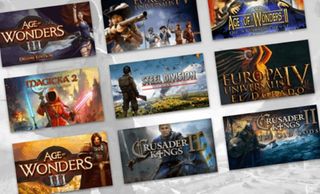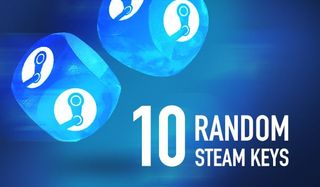PC game storefronts compared: what you need to know about retailers and resellers
Do you know where your game keys come from? How much money the developers get for each sale? We break it down.

Now that physical media is all but phased out, most PC game purchases happen on one of a few big game launchers. If you're buying games direct from one of these stores—Steam, Origin, Battle.net, GOG, the Epic Games Store, etc—anything you purchase is plopped directly into your library. But even if you leave the walls of these launchers, you're probably buying a 'key' that can be redeemed on one of them. That's where buying PC games gets a bit murky.
Publishers generate keys to pack in with physical special editions, or to sell through Humble Bundles, or to sell digital copies on Amazon and other retailers. There are also key resellers like G2A (not to be confused with retailers) where anyone who has a key can list it on a marketplace. A developer/publisher generated that key at some point, but after that, it could've changed hands several times before making its way to you.
Here, briefly, is how the business of selling PC games works, from the big stores down to the controversial key resellers, and our recommendations for where to get your games.
Distribution platforms: Steam, GOG, Epic

The gist: The top of the pyramid. These are the core PC game retailers that provide games directly from publishers. They're also where we actually download games. The wider game key market wouldn't exist without them.
Steam: The biggest of them all, Steam sells just about any kind of game you can imagine, and most game keys distributed online at other stores are redeemed through Steam.
Epic Games Store: Started as a launcher for Epic's Fortnite, then became a full store that has been nipping at Steam's leadership position with exclusivity deals.
Other major distributors: GOG, which exclusively sells DRM-free games, and itch.io, which is focused on indie games and is the only one of these which allows game publishers set their own revenue sharing percentage.
The biggest gaming news, reviews and hardware deals
Keep up to date with the most important stories and the best deals, as picked by the PC Gamer team.
Publisher-specific launchers: Several game publishers also have platforms that are, for the most part, the only places to buy their games on PC. EA has Origin, Ubisoft has Uplay (though it also sells on Steam and the Epic Store), Activision Blizzard has Battle.net, Bethesda has the Bethesda Launcher, and Microsoft has the Windows Store (but is selling more games on Steam these days).
Launchers like Origin are primarily built to serve one publisher's games, while Steam, GOG, and the Epic Games Store are built to support the whole industry.
How a sale breaks down
Both Steam and GOG offer game publishers a 70 percent cut of on-platform sales. Starting in late 2018, Steam offers a better 75 percent cut for games that bring in over $10 million, increasing it to 80 percent for games which have made over $50 million.
The Epic Games Store offers an 88 percent cut for all games, and Epic has made quite a bit of noise about its belief that this is a fairer deal.
On Itch.io, developers can choose how much of a cut to give to the store, from 0% to 100%.
What else is different between the stores?
There are a lot of differences, but whether you choose Steam, GOG, Epic, or another store largely depends on what game you're looking to buy. If you like your Steam friends list and the multiplayer integration it offers like we do, it's a great place to buy games—but not every game is on Steam.
When games are available on multiple stores, it's just about picking whichever you find most convenient. If you like the idea of DRM-free games, you might check to see if a game is on GOG before buying it on Steam or the Epic Store. GOG's new launcher, GOG Galaxy 2.0, is also a cool way to combine your game libraries.
Most games can be found on one or more of these big three—Steam, GOG, and the Epic Store—unless they exist in a standalone launcher, like League of Legends, or are exclusive to a publisher store, like Battle.net. For interesting indie and experimental games, definitely bookmark itch.io, too.
Key retailers: Humble, Fanatical, and more

The gist: These stores sell game keys that you can activate on one of the distribution platforms above, often in bundles or at reduced prices.
Only a game's publisher or developer can generate Steam keys for their game—Valve doesn't sell them in bulk to anyone—so before they're sold on a retailer, someone had to get them directly from the game's creators.
Sometimes this will be a middleman company, and sometimes game developers and publishers work directly with retailers. Rarely, a publisher might sell a bulk batch of keys to a retailer to do with as they please. More often, though, a publisher will give a retailer keys to sell, and then the retailer will report back after a certain amount of time, returning any unsold keys and paying the publisher their cut from the ones that sold.
Here are a few of the bigger key retailers:
Humble is the best known, and its bundles are worth keeping an eye on. You can often get some great games for $12, or even less, and we frequently post good deals and free game offers from Humble.
Fanatical, BundleStars, Green Man Gaming, and the others can also be good places to find deals, especially during sale events like Black Friday, where they often offer discount codes and big price reductions. There's no real downside to buying from these platforms if they're offering a good deal, except that you'll have to enter your payment information, potentially create an account, and redeem the key you get, which takes a little extra time.
Some publishers, such as Ubisoft, have stopped using keys. Instead, you have to link a Uplay account to purchase new Ubisoft games on retail sites, and the game is immediately tied to your account, so read sale listings carefully to know what you're getting, especially if you're buying a game as a gift.
Key resellers: G2A, Kinguin, and others

Resellers are stores that don't get their products directly from the source (like game publishers). G2A and Kinguin are reselling marketplaces, where anyone can sell keys. But there are also reselling storefronts, which look like other key retailers but don't get their keys directly from publishers.
We don't know where their keys come from, and they often sell games at lower prices than other retailers.
The gist: Key reselling marketplaces are like eBay, in that anyone who happens to be in possession of a game key can sell it on them.
There are normal ways to get a key that you then resell, like buying it in a Humble Bundle. There are also unscrupulous methods, such as pretending to be an 'influencer' to try to score a free key from a developer. How often fraud happens, and how much it costs developers, is an argument that has largely played out between indie developers and one of the most popular marketplaces, G2A.
Why key resellers are controversial:
Back in 2016, publisher TinyBuild accused G2A of selling $450K worth of stolen game keys. The method described by TinyBuild was simple: buy some stolen credit cards, buy a bunch of game keys with them, and then list the keys on G2A. Another trick is to exploit regional pricing, buying games in a region where they're cheap (but not region-locked) and then reselling them in USD.
There are also perfectly innocent reasons a person might resell a key. Say they bought a bundle, but don't want two of the games in it. They can list those games on G2A for something near what they paid for them, and get a bit of the cost of the bundle back. A legitimate purchase was made, it's just that the cost was transferred from one person to another.
That's not going to convince any game publishers to support key reselling, except perhaps in closed systems like the one proposed by RobotCache, where publishers get a cut of each resold game. On top of the fraud problem, they want to control where and for how much their games are sold, and so are always going to be at odds with those who see an opportunity in setting up an open marketplace for keys.
G2A in particular hasn't earned any goodwill from the way it interacts with the industry, with some devs going so far as to say they would rather people pirate their games than buy them there.

So long as keys are used to distribute games—and they may not exist forever—there's going to be a way to resell them, and so it's up to each of us to decide for ourselves whether or not we want to participate in that.
Our recommendation: Stick to the authorized sellers. If you're dealing with a retailer, you know for sure you're going to get a legitimate key, or at least that you can talk to a customer service rep if something goes wrong. If you're buying from a reseller, however, you're dealing with an individual who may be less reliable, and you might also have to jump through hoops, like receiving the game as a Steam gift rather than as a key. You also can't be 100 percent sure where the key came from.
A legitimately purchased game key is yours to use however you want, even to sell on G2A. That's your right. So it just comes down to a value judgment: Indie developers say these sites cause them big headaches, and we know how tough this business is. We value indie developers, and want them to keep making games we like. So when they say, 'Hey, if you want to play our games, please buy them from here, and not here,' we're inclined to listen.
And ultimately, there are tons of great deals to be found on authorized retailers. A lot of the keys being sold on these reselling sites come from bundles in the first place. Plus, free games are given away all the time on Steam, the Epic Games Store, Humble, GOG, and other sites. There are a ton of ways to get cheap or free games that don't require dealing with resellers.

Wes has been covering games and hardware for more than 10 years, first at tech sites like The Wirecutter and Tested before joining the PC Gamer team in 2014. Wes plays a little bit of everything, but he'll always jump at the chance to cover emulation and Japanese games.
When he's not obsessively optimizing and re-optimizing a tangle of conveyor belts in Satisfactory (it's really becoming a problem), he's probably playing a 20-year-old Final Fantasy or some opaque ASCII roguelike. With a focus on writing and editing features, he seeks out personal stories and in-depth histories from the corners of PC gaming and its niche communities. 50% pizza by volume (deep dish, to be specific).

Steam has changed its policy on DLC content and season passes, so now players are entitled to proper compensation if future plans fall through: 'Customers will be offered a refund for the value of unreleased DLC'

Indie distribution platform Itch.io now requires asset creators to disclose the use of generative AI in their work
Most Popular


